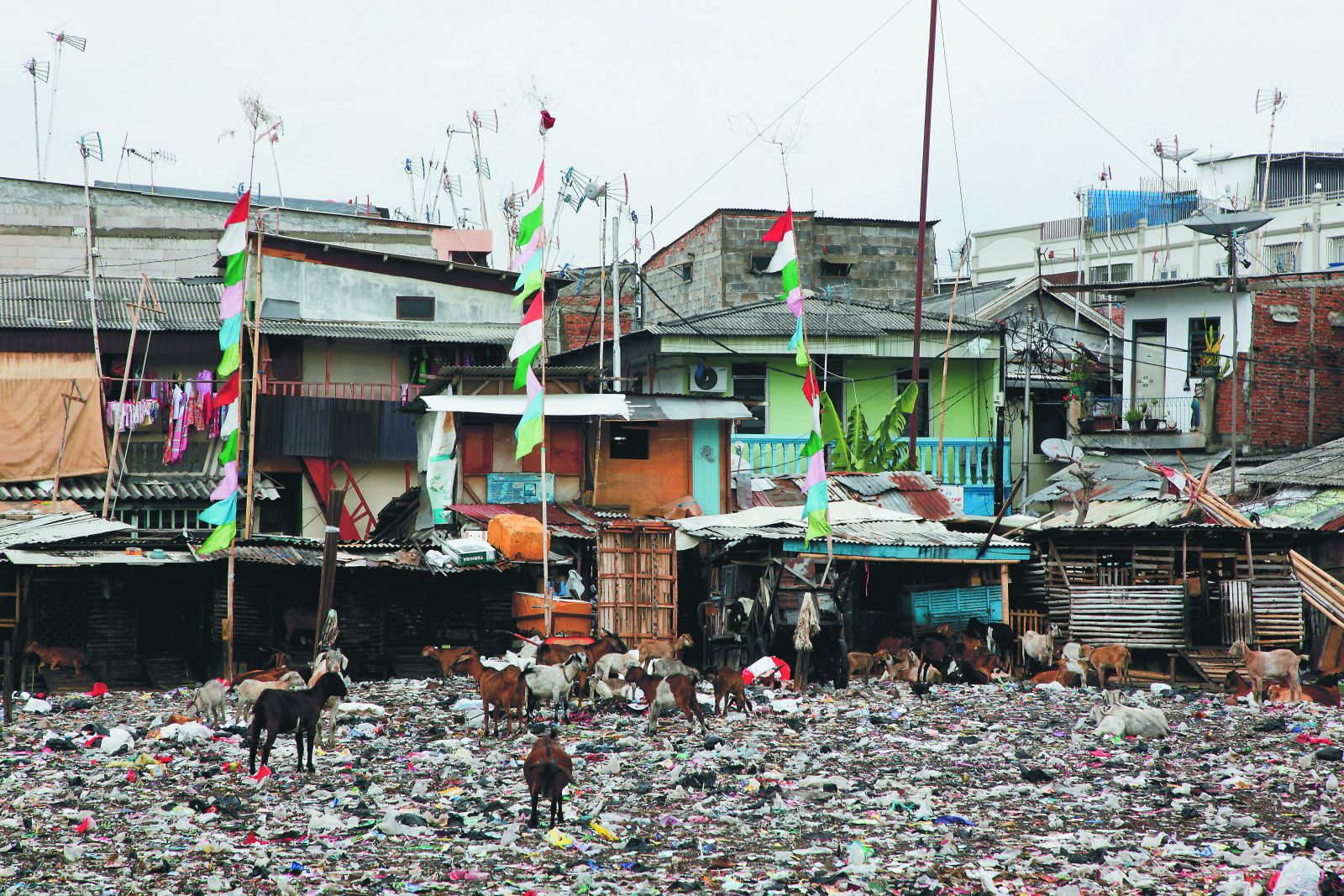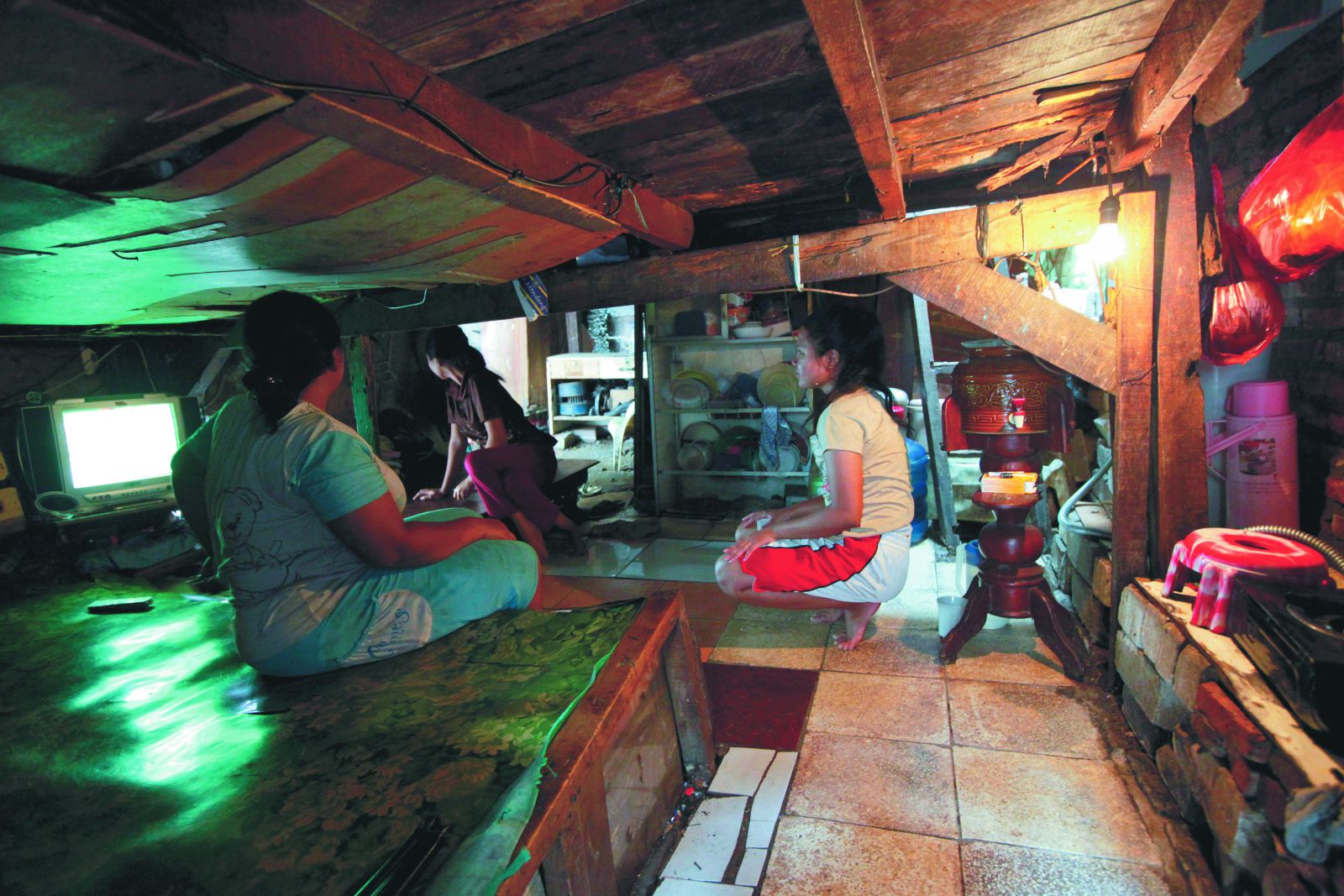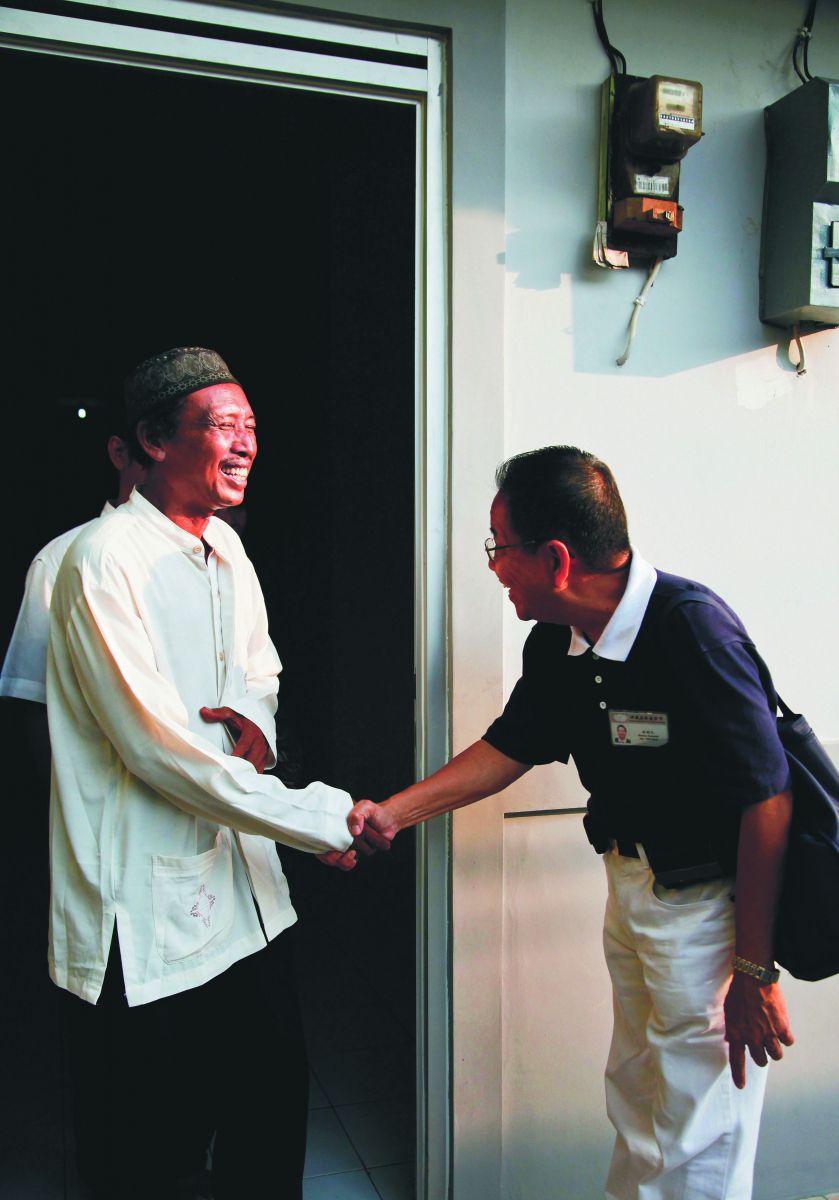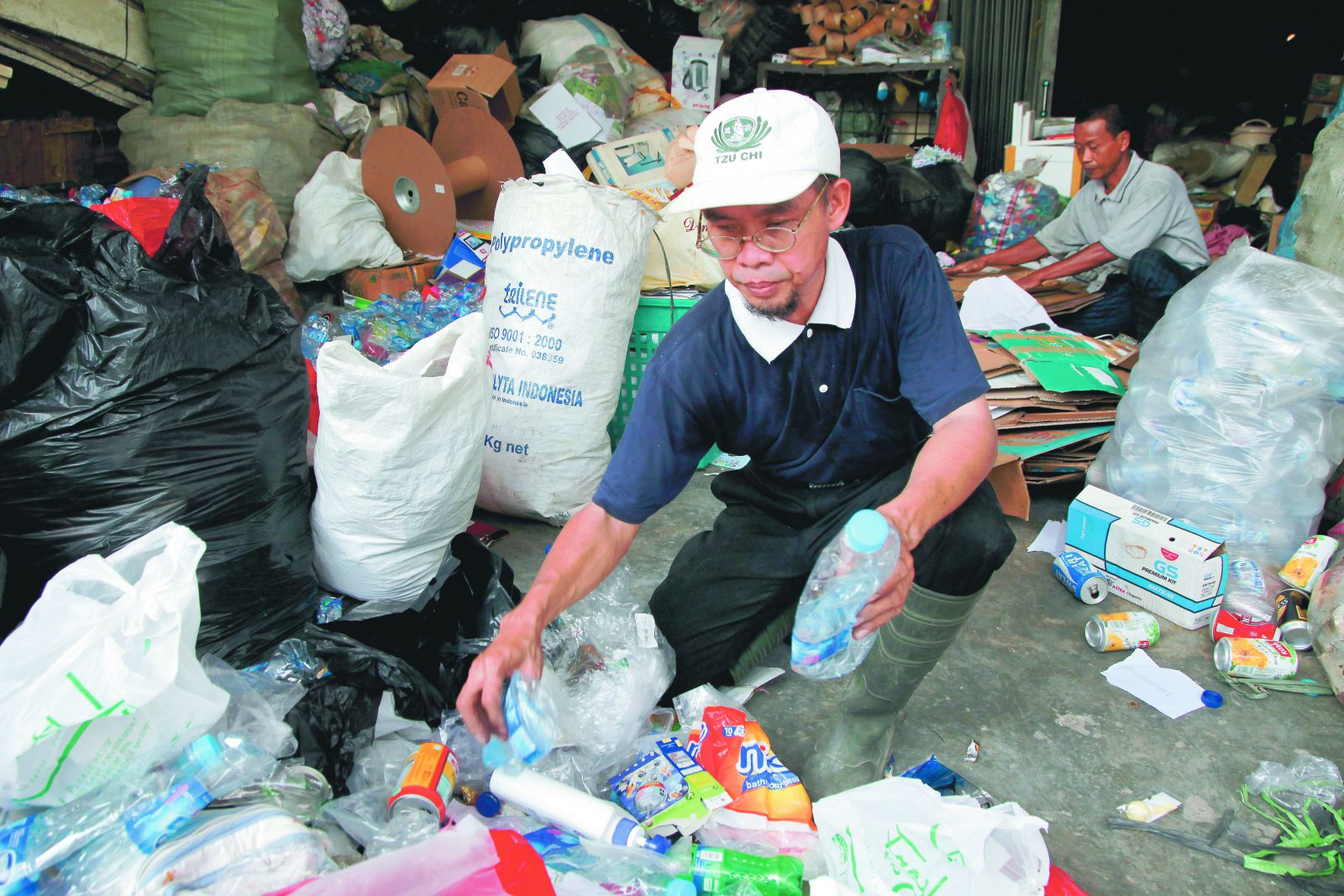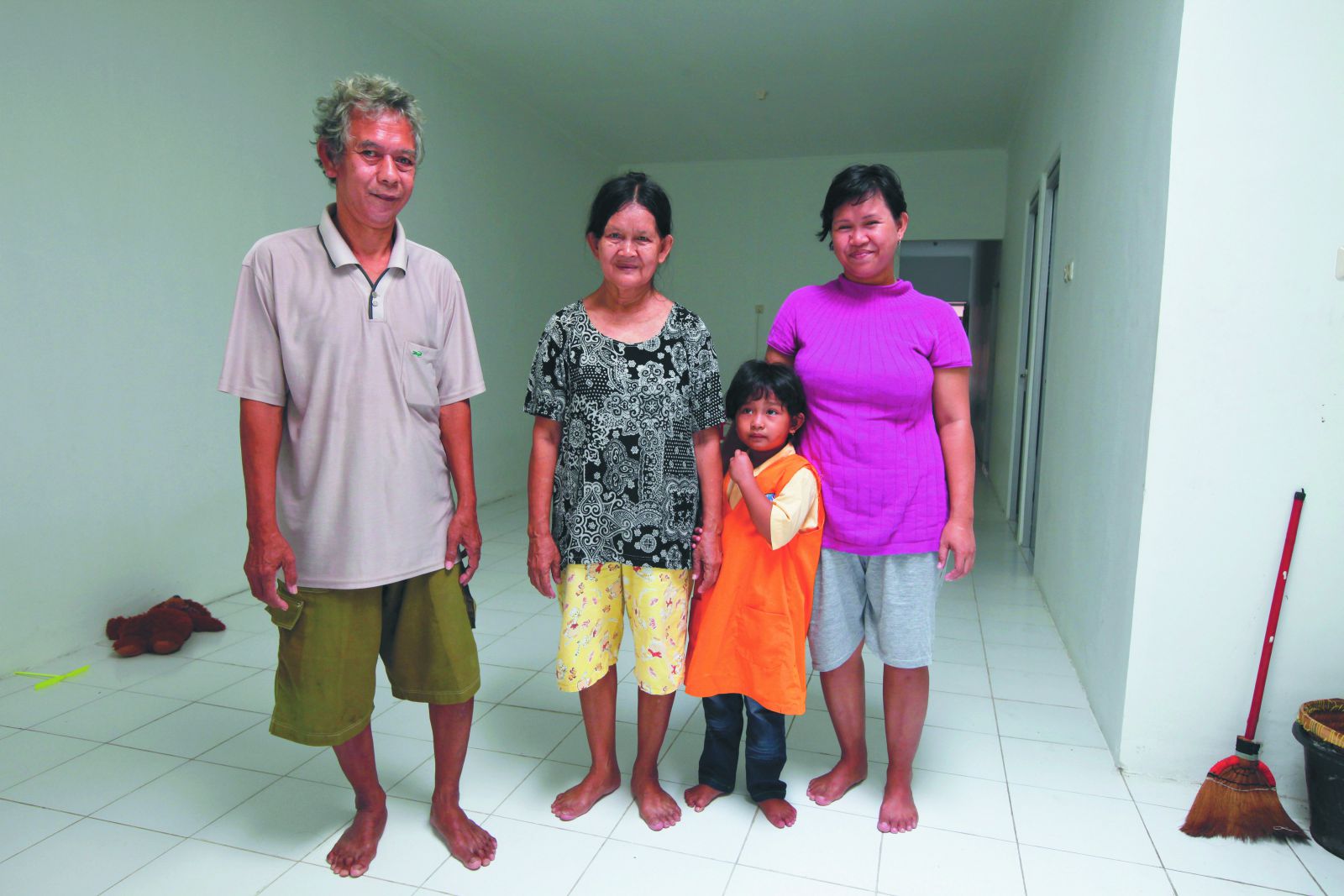

| New Homes Here and New Homes There | ||||||||
| By Ye Zi-hao Translated by Tang Yau-yang Photos by Lin Yan-huang | ||||||||
Jakarta, the national capital of Indonesia, teems with more than ten million inhabitants. Multitudes of destitute people from all over the country have flocked into this thriving city, hoping to eke out a better life for themselves. Many of them are forced to live in housing districts they can afford, districts where conditions are far from ideal. Sadly, they often lack the means to improve their lives. Over the past six years, Tzu Chi volunteers have built new homes for about a thousand families to replace the shanties in which they had been living. For those that have been helped by Tzu Chi, life is definitely looking up.
The village of Belakang is located in Kamal, West Jakarta, Indonesia. Single-story houses are common here, their gardens flourishing with abundant vegetables and fruit. Trees sway in the gentle breeze, their leaves peacefully fluttering back and forth. We found that the countryside ambience of Belakang was like a breath of fresh air within the hustle and bustle of the great city of Jakarta. This is one of the communities Tzu Chi helped improve by building new homes for indigent villagers who lived in old, run-down houses. Belakang used to be called a “backward village.” According to Tzu Chi volunteer Tan Soei Tjoe, many local residents worked odd jobs or sold recyclables, earning an unsteady income of one American dollar a day. As a result, they were too poor to keep up their homes. As more and more homes aged in neglect, the whole community looked run-down. Some villagers even lived with their livestock, heightening the residents’ chances of contracting diseases from the animals. Considering all this, it is no surprise the village got that unflattering nickname. But that began to change in December 2006. At that time, the government and Tzu Chi volunteers joined forces and started an aid project for Belakang. Eighty-two destitute families were selected for the project. Their old houses were torn down and new ones were built in their place. The project also improved the roads and the water supply in the village. The project was completed in the summer of 2007. Each of the new homes had a living room, two bedrooms, a kitchen, and a bathroom. The grayish white, reinforced-concrete structures were far superior to the houses of bamboo walls and dirt floors that they had before. Liam Warni’s family was one of those that benefited from the project. They live in a new house near the entrance to the village. Her husband is a janitor, and her mother-in-law lives with them. Liam is happy because their new house does not leak like their old one, whose roof was only tree leaves. Some residents that have moved into the new houses have used the grayish white exterior walls of their new homes as canvases, on which they have added their colorful creativity. They have brought much originality and local feel to the village. The improvements brought on by the Tzu Chi project have even attracted new construction in the village. “Look at those houses under construction over there. They’re not being built by us local people. People from the outside bought the land, and now they’re building on it,” said a villager by the name of Marshin. Some villagers have become regular donors to Tzu Chi as a result of this build-to-replace joint project. Their monthly donations of 3,000 or 5,000 rupiah (about half an American dollar), though not a great sum by any means, are a sure sign of goodness of heart, especially coming from people of little means.
More of the good thing The housing improvement project for the village of Belakang worked quite well, and the quality of living there has improved substantially. The government has even designated it a model village. Building on the success in Belakang, Tzu Chi volunteers began to replicate the project in other Jakarta communities, including West Pademangan, Kelapa Gading, Cilincing, and Jalan Lautze. They built new houses and improved the standard of living of the recipients, which contributed to the improvement of the whole environment in those communities. Volunteers in Bandung, West Java, and Makassar, West Sulawesi, have also replicated the experiences of their counterparts in Jakarta. Agus Yatim, nearly 50, lives in a new house that Tzu Chi built in West Pademangan, North Jakarta. Sitting in his new home, he reminisced about the past. He said he moved with his parents into their old home when he was eight years old. Over the years, more and more people moved into the same neighborhood. However, prosperity or increased living standards didn’t come with the increased housing and population density—because the district began to sink lower. Excessive pumping of groundwater in the Jakarta area caused the water table to decline. As the water went down, the ground sank and the community with it. This subsidence was the last thing the residents of West Pademangan needed. The area is not far from the sea, and the sinking ground made the region prone to frequent flooding. Because of that, the government raised the surfaces of the roads, relegating the houses along the way to low ground. That, and the sinking of the water table, exacerbated the dire situation that the residents had to face, particularly during high tides. Those who could afford to do so had their homes raised or moved away. Those who did not have the means to improve their homes could only stay and endure the ever-worsening floods. “During high tides, water would gush up between our floor tiles. We had to sleep upstairs [if we wanted to stay dry],” recalled Agus Yatim. “Look! That second floor has become the first floor,” he continued, pointing at an abandoned house nearby. If a person stood on the first floor of that house looking out the window, their eyes would be at the knee level of a person standing on the raised road outside. Agus Yatim’s old house was just like that house he was pointing at. “I used to climb directly into the second floor if the first floor was flooded.” Life for him and his family finally began to improve in early 2008, when Tzu Chi joined the North Jakarta city government and the military and started to build new houses to replace the run-down homes of destitute residents in West Pademangan. When the residents first met Tzu Chi volunteers, they were wary about the foundation’s offer to build them new homes for free. They wondered what the catch might be. “Other groups had come before Tzu Chi and offered to help us, but we later saw the strings that they had attached: They wanted to convert us to their religion,” said Agus Yatim. That would be a significant request for anyone, but all the more so for Agus. He is a devoted Muslim and has taught the Koran to women and children in the community for many years. Tzu Chi volunteers told Agus the ideals and missions of the foundation, and provided examples of how its assistance had been given out. Then he saw a neighbor’s child taken to a Tzu Chi free clinic to have his goiter treated. The boy was cured without Tzu Chi volunteers asking for anything in return. “Ever since then, I’ve felt that it is a trustworthy group,” he said.
Seeking out the needy Kaswanto and his wife, Yuliati, both in their 40s and also residents of West Pademangan, had become Tzu Chi volunteers. When we met them, they were looking forward to moving into a new house that would be finished by Tzu Chi two months later. In addition to being house recipients themselves, they accompanied their village head and some other officials around the village to identify the families most in need of new homes. Kaswanto and Yuliati have three children. Their oldest daughter is studying accounting at a private vocational high school, the tuition and fees for which are substantial. Their youngest child, a son, is just two years old, and Yuliati stays home to take care of him. Thus, the financial burden of the whole family falls solely on the shoulders of Kaswanto, who works at a plastics factory. To get into their old house, we first had to bend down and walk through a tunnel-like entryway. The couple was quite creative and had paved their concrete floor with tiles discarded by others, adding a distinctive artistic flavor to their home. However, their house was next to a large drainage ditch and was therefore very susceptible to flooding, which was a great inconvenience. Their home, while far from ideal, was not as derelict as some other houses in the area. “You must come take a look at this house,” they said, as they led us through some dark alleys to a small, dilapidated wooden house. The decaying double-decker building was barely standing. In the bottom level we saw a bed and some cooking utensils, but it was so low only small children could stand in it without having to bend down. It was raining, and we noticed that the area under the bed was very muddy. Though Kaswanto and Yuliati’s old house was worn and in need of repair, at least their floor was covered and there was enough headroom to allow us to stand upright. Seeing this old ruin made us wonder how many more houses like this one existed in the dark corners of Jakarta. Kaswanto and Yuliati do recycling and solicit donations for Tzu Chi. Yuliati pays back to society in another way, too: She tutors students on Thursdays in a nearby park. “Children here are relatively weak in their lessons, so I help them learn,” she said. “I also teach them to be grateful and to cherish things.” Yuliati said that when they move into the new house built by Tzu Chi, “I’ll put some books recycled from our local recycling station in the front room of our new home. They’ll help the children greatly.”
A fire-ravaged community In addition to building new homes to replace old decaying ones, Tzu Chi also has helped destitute fire victims rebuild their houses. A fire hit Jalan Lautze (Lautze Street) in Central Jakarta, on February 7, 2012. The conflagration burned down 394 houses and left more than 1,200 people homeless. “Many people escaped the fire with only the clothes on their backs,” Tzu Chi volunteer Hendra Kaston said as he walked through the neighborhood, where the charred vestiges of the inferno were still visible. Immediately after the fire, Tzu Chi volunteers began distributing daily necessities to fire victims. Next, they went with village officials to call on the victims and determine their economic status, verify their land ownership, and assess the amount of damage caused by the fire. Volunteers hired builders to prepare the sites, and they started building new homes in May of the same year. Fire-retardant materials were used in the new construction, adding a measure of safety in this densely populated neighborhood. Over a hundred houses were built. Suwarni, 95, received a new home. She lost her daughter at the beginning of 2012, and then she lost her old home to the fire a few weeks later. She was in dire straits. A granddaughter did odd jobs to support her. Touched by the help that Tzu Chi volunteers gave Suwarni and her granddaughter, a neighbor was willing to sell a bit of land to Tzu Chi to augment Suwarni’s original land before Tzu Chi rebuilt her home for her. Though her new place is still quite small, merely four square meters (43 square feet), she can now live in peace in familiar surroundings. Hassan Dan’s new home was built on the land on which he has lived since he was born, 60 years ago. When his father died, he left the land to him. “The families of my two sons and my daughter live in the new house. Adding my wife and me, that’s four families that live here,” said Hassan Dan. Although occupied by so many people, his house is spacious compared with Suwarni’s little one. This large household is supported by the meager incomes of his two sons and son-in-law. The family has settled down in their new house. Hassan Dan’s daughter described a typical day for the family: “In the morning, the children go to school, and the men go to work. Everyone comes home at night, and we watch TV and chat. It’s great to be able to live here.” It has been six years since Tzu Chi started building replacement homes such as the ones described above. About a thousand homes have been built so far, covering areas in Jakarta, West Java and West Sulawesi. These building projects are in addition to larger projects that Tzu Chi had previously undertaken. In 2003 and 2005, the foundation completed two Great Love Villages for impoverished people who lived along the Angke River, and it built three more villages after the 2004 Indian Ocean earthquake and tsunami. In all cases Tzu Chi gave new homes to the needy, and its volunteers shared Tzu Chi ideals with them. The needy now have better homes, and they may be further inspired to help other less fortunate people in society and thus live more fulfilling lives.
|
















|

